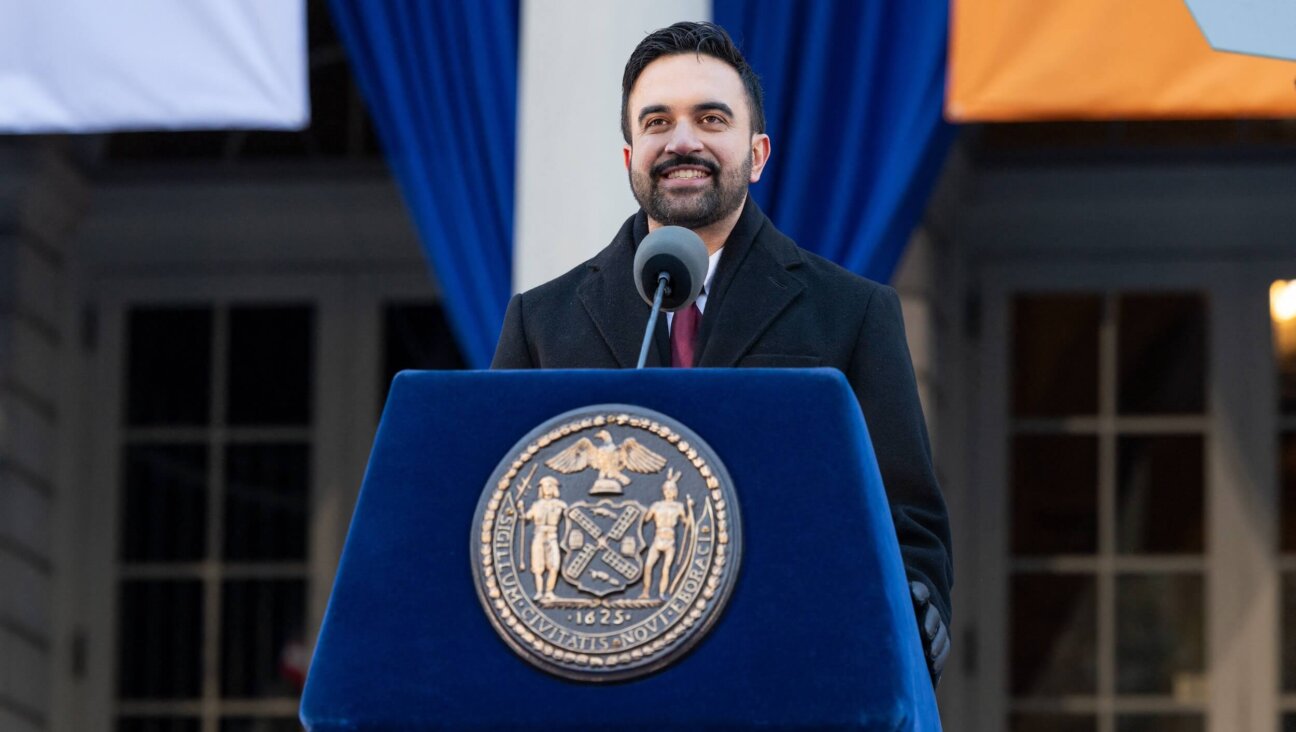After Bibi’s Speech: A Shift To Quiet Talks

Graphic by Angelie Zaslavsky
The Obama administration now seems poised to ease its public pressure on Israel following Prime Minister Benjamin Netanyahu’s acceptance of a two-state solution to his country’s conflict with the Palestinians.
Following Netanyahu’s much awaited June 14 speech addressing America’s concerns about the policies of his new government, Israeli diplomats said they sensed a new willingness within the administration to “find creative solutions” to the issue of Jewish settlement activity in the Israeli occupied West Bank that would allow some limited building to continue.
Former senator George Mitchell, the administration’s special envoy to the Middle East, seemed less confident than his Israeli counterparts that a solution to the dispute was imminent. Speaking at a Washington press conference June 16, Mitchell said he was not aware of an agreement that would allow Israeli building for “natural growth” in established West Bank Jewish settlements, a right upon which Netanyahu insisted in his speech.
But after a long period of public criticism of Israel by Washington, discussions over the settlement issue are now shifting to quiet working-level talks between American and Israeli officials. The main channel for these discussions is expected to be Mitchell’s newly established Israel office. The office will be headed by David Hale, a career diplomat with vast experience in the Arab-Israeli field. From his Jerusalem headquarters, Hale is expected to involve himself deeply in the detailed negotiations surrounding Israel’s demand to continue building in established settlement blocs.
“We intend to bring these discussions to a very early conclusion,” Mitchell said at his press conference, expressing hope that direct Israeli–Palestinian talks will be launched in the near future.
Administration officials have been adamant in demanding that Israel take down illegal settlement outposts, as it has long promised to do, and cease all settlement expansion, including what Israel calls “natural growth” in established settlements regarded as legal under Israeli law, but illegal by most of the rest of the world. The so-called Middle East road map to peace, forged by the Bush administration with international partners in 2002, also prohibits such growth. Israel accepted the road map, but not the section barring natural growth.
In his speech, given at Bar-Ilan University, a bastion of support for the settlements, Netanyahu once again rejected the demand to curb natural growth, even as he formally acceded to another Obama administration demand: the concept of a Palestinian state as a goal of negotiations, as agreed to by earlier Israeli governments.
“I’m sure Bibi’s speech helped,” said Israel’s deputy foreign minister, Danny Ayalon, in a June 16 interview with the Forward. “Now that we are united about the vision [of a two-state solution] we can focus on the practical issues and work quietly on how to resolve them.”
In his speech, Netanyahu defended his rejection of the American demand for a complete settlement freeze.
“There is a need to enable the residents to live normal lives, to allow mothers and fathers to raise their children, like families elsewhere,” Netanyahu said. “The settlers are neither the enemies of the people nor the enemies of peace.”
Speaking two days later with reporters at the White House, President Obama flatly rejected Netanyahu’s insistence on a right to “natural growth” in West Bank Jewish settlements. Obama warned that despite the “tendency to try to parse” the exact meaning of “cessation of settlements,” he believed that all parties understand that “if you have a continuation of settlements that, in past agreements, have been categorized as illegal, that’s going to be an impediment to progress.”
Israeli sources who deal closely with the issue say that despite Washington’s unchanged public insistence on a “complete freeze” formula, in recent discussions American officials seemed open to a more nuanced approach. The Israelis argue that the administration understands now that private contracts for building new homes in the settlement blocs are hard to break and that in some cases there is room for leniency.
Israel has suggested the establishment of a “reporting mechanism” in which it would provide, for the first time, full information about all the building going on in the West Bank. This mechanism is expected to serve as a forum in which “extraordinary cases” would be discussed. Israeli officials said they believe that in some cases, such as when there is a need for a new classroom, the Americans will allow a certain amount of flexibility.
“I’m confident that we will be able to reach an agreement in the near future that will enable us to put the settlement issue aside,” Israel’s ambassador-designee to Washington, Michael Oren, said in a June 15 interview with Reuters news agency.
While agreeing to move the settlement debate to private negotiations from the public sphere, the administration was careful not to be seen as forgoing the issue.
Observers on the dovish side, such as former Israeli peace negotiator Daniel Levy and Amjad Atallah of the New America Foundation, believe that maintaining a tough stance on the settlement issue is crucial for success of the process. “The Obama administration needs to stick to its principle of a total freeze, whether in public or private conversation,” they wrote in an analysis of Netanyahu’s speech. “There can be only one place for a discussion of the future of settlements and that is delineating a permanent status border between Israel and Palestine.”
In its early reaction to Netanyahu’s speech, the American administration chose to focus on its positive aspects and showered praise on Netanyahu for what White House spokesman Robert Gibbs called “a big step forward,” referring to the Israelis’ acceptance of the concept of a Palestinian state.
But the administration pointedly declined to adopt two key conditions that Netanyahu attached to recognition of a Palestinian state, at least in advance of Israeli-Palestinian negotiations. In his speech, the Israeli leader demanded that Palestinians formally accept Israel as a Jewish state as part of any final peace agreement. Obama, like previous American presidents, made a point of mentioning the term “Jewish state” when talking about the two-state solution. But he did not adopt the demand that the Palestinians make this recognition.
Netanyahu’s second condition, that the Palestinian state be demilitarized, also has been accepted in principle by the past three administrations, but is viewed by Obama and his team as an issue that needs to be part of the direct negotiations between the sides, not a precondition.
Contact Nathan Guttman at [email protected]













